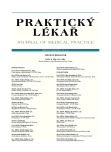-
Medical journals
- Career
Základy kognitivní, afektivní a sociální neurovědy
IX. Altruismus
Authors: F. Koukolík
Authors‘ workplace: Primář: MUDr. František Koukolík, DrSc. ; Národní referenční laboratoř prionových chorob ; Fakultní Thomayerova nemocnice s poliklinikou, Praha ; Oddělení patologie a molekulární medicíny
Published in: Prakt. Lék. 2011; 91(9): 507-511
Category: Editorial
Overview
- Hamilton´s kin selection (inclusive fitness),
- Triver’s and Maynard-Smith´s reciprocal altruism
are classical theories explaining biological altruism.
Human altruism is unique in the animal world. It has phylogenetic and ontogenetic roots. Human altruism is based on strong reciprocity – a combination of altruistic punishment and rewarding. Simon’s elegant theory of social selection and succesful altruism explains human altruism in terms of docility and bounded rationality.
- Inequity aversion,
- reciprocal fairness, and
- reputation seeking
as explaining theories are investigated in economic games.
Human altruism has neurobiological correlates evident in experiments making use of functional imaging and molecular genetic methods. Batson’s interesting interpretation explains human altruism as evolution of mammalian and human parental nurturance and empathy.Key words:
human altruism, evolution, neurobiological correlates, Batson’s interpretation.
Sources
1. Avital, E., Jablonka, E. Animal traditions: behavioural inheritance in evolution. Cambridge: Cambridge University Press 2000.
2. Basile, B., Mancini, F., Macaluso, E. et al. Deontological and altruistic guilt: evidence for distinct neurobiological substrates. Human Brain Mapping 2011, 32, p. 229-239.
3. Batson, C.D. The naked emperor: seeking a more plausible genetic basis for psychological altruism. Economics and Philosophy 2010, 26, p. 149-164.
4. Berg, J., Dickhaut, J., McCabe, K. Trust, reciprocity and social history. Games Econ. Behav. 1995, 10, p. 122-142.
5. Boesch, C., Bolé, C., Eckhardt, N. et al. Altruism in Forest Chimpanzees: The Case of Adoption. PLoS ONE 2010; 5(1): e8901. doi:10.1371/journal.pone.0008901.
6. Bolton, G.E., Ockenfels, E.R.C. A theory of equity, reciprocity, and competition. Am. Econ. Rev. 2000, 90, p. 166-193.
7. Darwin, C. The descent of man and selection in relation to sex. New York: Appleton, 1871.
8. De Dreu, C.K.W., Greer, L.L., Handgraaf, M.J.J. et al. The neuropeptide oxytocin regulates parochial altruism in intergroup conflict among humans. Science 2010, 328, p. 1408-1411.
9. Dufwenberg, M., Kirchsteiger, G. A theory of sequential reciprocity. Games Econ. Behav. 2004, 47, p. 268-298.
10. de Quervain, D.J., Fischbacher, U., Treyer, V. et al. The neural basis of altruistic punishment. Science 2004, 305, p. 1254-1258.
11. Fehr, E., Fischbacher, U. The nature of human altruism. Nature 2003, 425, p. 785-791.
12. Fehr, E., Fischbacher, U. Third-party punishment and social norms. Evol. Hum. Behav. 2004, 25, p. 63-87.
13. Fehr, E., Fischbacher, U. Human altruism – proximate patterns and evolutionary origins. Analyse&Kritik 2005, 27, p. 6-47.
14. Fehr, E., Fischbacher, U. Altruists with green beards. Analyse&Kritik 2005, 27, p. 73-84.
15. Fehr, E. The nature of human altruism. Carl Snyder Memorial Public Lecture. University of California, Santa Barbara 7. 3. 2005.
16. Gintis, H., Smith, E.A., Bowles, S. Costly signalling and cooperation. J. Theor. Biol. 2001, 213, p. 103-119.
17. Hamilton, W.D. The genetical evolution of social behaviour I and II. J. Theor. Biol. 1964, 7, p. 1-32.
18. Hamilton, W.D. Innate social aptitudes in man: an approach from evolutionary genetics. In: R. Fox (Ed.). Biosocial Anthropology. New York: Wiley 1975.
19. King-Casas, B., Tomlin, D., Anen, C. et al. Getting to know you: reputation and trust in a two-person economic exchange. Science 2005, 308, p. 78-83.
20. Koukolík, F. Sociální mozek. Praha: Karolinum, 2006.
21. Koukolík, F. Základy kognitivní, afektivní a sociální neurovědy II. Empatie. Prakt. Lék. 2011, 91, (2) s. 63-67.
22. Leimar, O., Hammerstein, P. Evolution of cooperation through indirect reciprocity. Proc. R. Soc. Lond Series B-Biological Sciences 2001, 268, p. 745-753.
23. Levine, D.K. Modeling altruism and spitefulness in experiments. Rev. Econ. Dyn. 1998, 1, p. 593-622.
24. Maynard-Smith, J. Group selection and kin selection. Nature 1964, 201, p. 1145-1147.
25. Maynard Smith, J. The origin of altruism. Nature 1998, 393, p. 639-640.
26. Silk, J., Brosnan, S., Vonk, J. et al. Chimpanzees are indifferent to the welfare of unrelated group members. Nature 2005, 437, p. 1357-1359.
27. Simon, H.A. A mechanism for social selection and successful altruism. Science 1990, 250, p. 1665-1668.
28. Reuter, M., Frenzel, C., Walter, N.T. et al. Investigating the genetic basis of altruism: the role of the COMT Val158Met polymorphism. Soc. Cogn. Affect. Neurosci. (2010) doi: 10.1093/scan/nsq083.
29. Rilling, J.K., Sanfey, A.G., Aronson, J.A. et al. Opposing BOLD responses to reciprocated and unreciprocated altruism in putative reward pathways. Neuroreport 2004, 15, p. 2539-2543.
30. Sober, E., Wilson, D.S. Unto others: the evolution and psychology of unselfish behavior. Cambridge MA: Harvard University Press, 1998.
31. Trivers, R.L. The evolution of reciprocal altruism. Q. Rev. Biol. 1971, 64, p. 35-57.
32. Warneken, F., Tomasello, M. The roots of human altruism. Br. J. Psychol. 2009, 100, p. 455-471.
Labels
General practitioner for children and adolescents General practitioner for adults
Article was published inGeneral Practitioner

2011 Issue 9-
All articles in this issue
- Demodicidosis
- Glomus tumour of a finger
- One hunfred years of allergen immunotherapy, first year in the form of sublingual tablets
-
Základy kognitivní, afektivní a sociální neurovědy
IX. Altruismus - Primary prevention of cancer
- Orthostatic hypotension
- Continuing Education of General Practitioners and new Czech Medical Chamber rules
-
Program Zdraví 2020
Budoucnost evropské zdravotní politiky - A view of young Czech practotioners on vocational training – research questionnaire
- Interaction of alcohol and other drugs: a serious problem
- General Practitioner
- Journal archive
- Current issue
- Online only
- About the journal
Most read in this issue- Orthostatic hypotension
- Glomus tumour of a finger
- Demodicidosis
- Interaction of alcohol and other drugs: a serious problem
Login#ADS_BOTTOM_SCRIPTS#Forgotten passwordEnter the email address that you registered with. We will send you instructions on how to set a new password.
- Career

